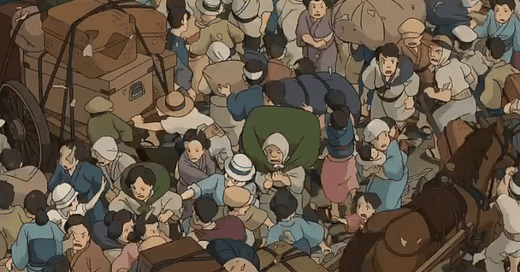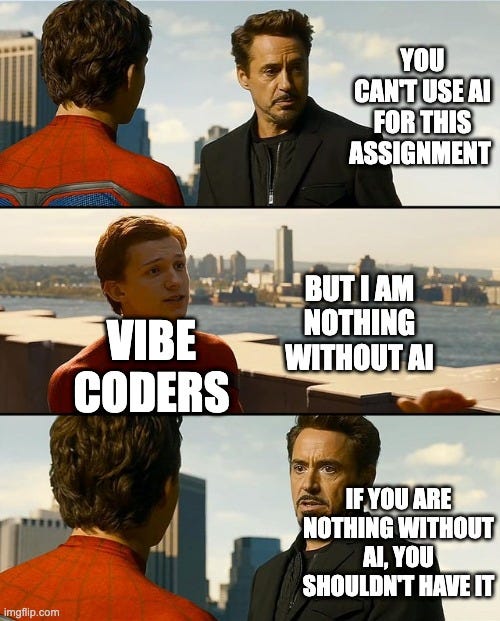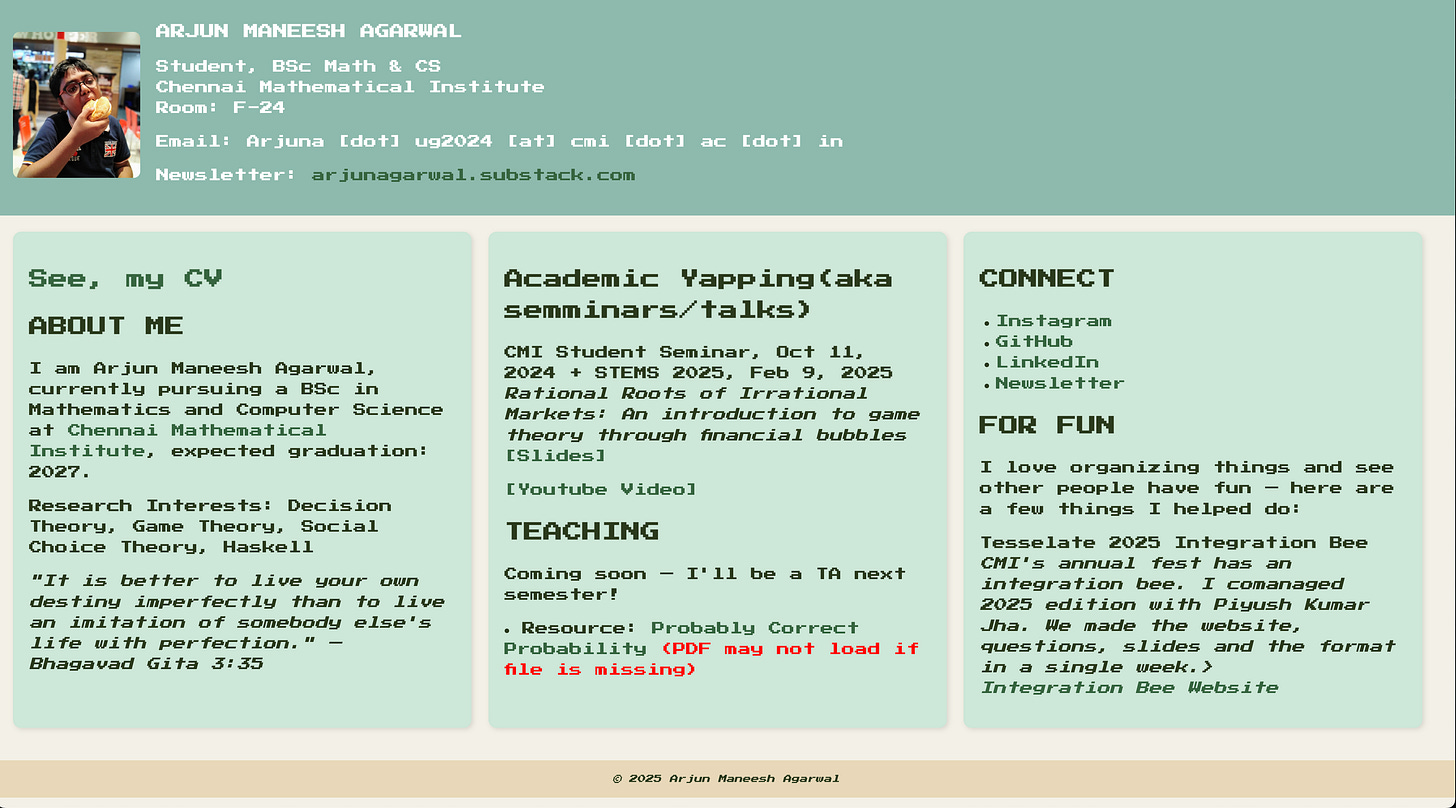The Arrogance of Ignorance
When pretending to be interesting is easier than being interesting and why trying is the whole point!
There was this recent news that 60% of people attending Coachella (the music festival for people who are unaware), are doing so on post financing or EMI based options.
Basically, people are taking loans to attend a music festival.
And this may seem like a dumb people problem, but then again, we are seeing credit card debt sky rocket among Gen Z and late millennials. According a Federal Reserve Bank of New York, Gen-Z has the fastest growing credit card debt and credit defaulting is at an all-time high.
This is leading to a situation where a lot of people are just catching up, instead of saving anything.
The reasons for this are varied. While many say that this is due to ‘let me treat myself’ caused by the increasingly chaotic and pessimistic world we live in. But then again, people are spending money just to fit in. Sneakerheads are people who own sneakers. Fashionistas buy the newest things. Bookstagram is promoting the image of the reader who owns shelves and shelves of books. And to be a music fan, you gotta be at the Coachella.
With the loneliness epidemic, and communities being so consumption-centric, we see a rise in basically, and sorry for the term I use, immature spending.
I believe a lot of this comes down to the devaluing of art and things. Let me explain.
This piece, in some form, has been around in my mind since the Ghibli Apocalypse. If you live under a rock, since the last few weeks, the internet has been flooded with Ghibli-style images (and now AI-generated starter sets, if that is what they are called).
An animation studio, creating films with a cast and crew of hardly 200 people, a studio with 7 Oscar nominations (on a total of 22 films), and the first three things I get when I search them
Free Ghibli AI Generator - Convert Image to Ghibli Style
Generate & restyle images in Ghibli style
How can I convert my photo to Ghibli?
The Google autocomplete results are not much hopeful either.
What we are seeing is an art style, one which took effort, heart and work, being reduced to a prompt.
I must add that what AI generates is not even close to the level of Eiji Yamamori, the animator who made the last scene. It is a cheap copy.
The problem is when cheap copies flood the markets, the real thing loses most of its value out of sheer saturation.
It is a common tale recounted in Indian history that, before industrialisation, most of the world’s fabric was made in India. We represented 20% of the world's GDP. It is said that the artisanal cotton from India was woven as light as air.
And then the machines hit. They can’t produce that kind of cotton even today. But the flooding of the market by British cotton was enough to shut down these hand looms and basically kill off these artisans. Of course, there was still speciality demand. Some queens wanted handmade things, but making a livelihood doing fabric was over.
I don’t think the parallels are hard to see.
On the same side, it is becoming harder and harder to be a ‘new’ artist or writer or coder.
Recently, Twitter user Noodles(handle: noodles_and_tea) decided to draw themselves in the Ghibli style using, you know, actual art. Someone fed it to AI and wrote “Not a bad attempt, 4o fixed it for you” along with an image generated with GPT-4o ‘fixing’ the art. Below it, a user with the name John Wolf (handle: ICBMinvestments) decided to say, “What a waste of time, you can use Chatgpt for a better result, don’t you know?”
Brannen Ownes told, “I did the same thing with AI. How long did it take you?”
Homelander MMA said, “Ai looks better and is 100x quicker, get some new skills.”
Faze Ronaldo(a streamer) added to the discourse:
Asamgold(another streamer) said some stuff about artists going to get replaced or jobless or whatnot.
Many of them even said that AI is making art accessible. It is clear that education, even educational supplies, like pen, pencil and paper, weren’t able to permeate some parts of the world. I would ask how did internet and laptops, and smartphones reached these remote parts of Los Angeles, California.
Jokes aside, this is what scares me. Not that AI will make better art, it won’t. But that AI will say that if your art is below some level, just quit. And that will cause a lot of people to never learn art.
And what it does further is it reduces things to adjectives. Most people I know making AI Ghibli art haven’t seen a single Ghibli film.
As an undergrad at a prominent research university, I surrounded with a rather smart set of people, most, if not all, of them are much smarter than I am. And I still see this kind of takes get traction.
To give an example, say PJ is a below average bowler. A new guy, say X, joins the cricket club and someone tells him, it hardly takes 10 hours to be better than PJ at bowling.
If X keeps saying that even PJ can bowl better than him, and hence bowling has no point. X will continue sucking at bowling. Even if X gets short surges of motivation, X will practice for 2 hours and say, “8 more to catch up with PJ? I should quit instead.”
And now say X is this determined fellow, who is spending time bowling. And a bunch of passersby keep telling him that “he is wasting his time.”
All this seems to be a pretty disheartening condition, but a common one nonetheless. Especially in Asia, where comparing kids is a sad reality. But the thing is if X wants to play cricket well, he will need to put in the effort. The problem arises when we suddenly offer X a tool that makes him slightly better than PJ.
Now X has no incentive to even try. And now that everyone who is below PJ starts using this tool, this becomes a baseline. The problem is, this tool in not making you better at bowling. So this becomes your peak, if the tool becomes better, sure, the base improves. But suddenly, no one can bowl at a top-class level as they never had the incentive or motevation to fail as a begginer.
Furthermore, now that everyone is bowling like PJ, all these people together judge this mediocre bowling as good bowling, and when they meet a real bowler, they insult him by showing their device and calling him a fool for not using it.
I made the above analogy at expense of PJ as a form of subtle revenge. Dhruv Verma bhaiya and I wrote a script for a play to be performed at the farewell. While discussing something about it in the mess, PJ commented that “We could have saved time and have ChatGPT write the play.”
But while PJ eventually understood the implications of his statement, I don’t think a lot of other people do. We are seeing a huge bunch of ‘vibe’ coders emerge and using AI to write code. To quote Tony Stark, “If you’re nothing without the suit, then you shouldn’t have it.”
We are already seeing security weaknesses in AI made software. Weaknesses these ‘vibe’ coders are seldom well read in detecting or fixing.
An example from my life is the fact that I am terrible at HTML/CSS/JS. So I can’t make websites from scratch(atleast not half decent ones). So in hurry, I used AI to set-up the 2025 Puzzle Hunt website and pushed it without checking the code.
Result, one of the winning team members inspected the page and found this piece:
<script>
...
function checkAnswer1() {
...
if (answer === 'rayquaza') {
...
} else {
...
}
}
...
<!-- All answers followed in similer format below -->
</script> One doesn’t need to know to read code to realize that GPT had put all the answers without any obfuscation or security in a publically accesible file. Luckily, they wasted enough time in the actual physical part.
So, what is the point of this huge AI hit piece?
That over the last few years, we are moving towards a society which celebrates ‘mediocrity’ and people have this weird anti-intellectualism. As poet Sailesh Lodha puts it, “We are in an age where people are arrogent about ignorence.”
People feel proud to tell others that they can get by without some information. Like during winter, I had gone to Jodhpur for a winter school on Fair Division. Before going, I was talking to a friend about it. Fair division is a mathematical/CS area where we try to satisfy people with differing demands and values. My friend, an engineer obviously, replies, “This is a pointless subject. I have never needed to use anything like this to divide things.” My friend never thought about divorce or property settlements, where people are adversarial. And I have heard worse.
While I can talk a lot about anti-intellectualism, I am much more afraid of the air of mediocrity we can see. People no longer want to read difficult works, they just want to read short, breezy stuff. Work which seems to be generated by ticking off a checklist.
I know people who buy tons of books, not to read them but to be a reader.
Basically, except for some intellectual circles, the most consumed content has regressed.
And that’s the frightening part.
We're no longer trying to become good. We're trying to appear good. And if we can’t do that with skill or effort, we outsource it to a tool or a payment plan or a trend. AI can write your code. EMI can buy your tickets. You can fake your taste by following whoever is trendy (yes, I am looking at all the people who listened to Kendrick post Super Bowl for a week and then jumped to the next trendy thing), and in a society filled with ‘arrogance of ignorance’, we reward this behaviour.
But none of this builds taste or skill or ability.
It doesn’t teach you how to animate a leaf trembling in the wind or code a website that doesn’t scream its secrets. It doesn’t make you skilled at understanding fairness and matching or writing a story that keeps someone awake the night.
We’re seeing what happens when society values the aesthetic more than the effort. When being seen as something replaces becoming it. When Ghibli becomes a filter instead of a film. When sneaker culture is less about expression and more about ownership.
The dangerous part isn't that AI can write a poem or build a website. It's that a generation might grow up believing the poem doesn't matter if no one claps. That there is no difference in being better than PJ with a shortcut is the same as becoming better than PJ the hard way.
What happens when everyone gets to “good enough” instantly?
Nobody becomes great.
What happens when communities are driven by consumption?
They stop being communities.
Communities are built on what we share. Struggles, stories, time, silence, rituals. But when the glue becomes consumption—what shoes you wear, what concert you flew to, what aesthetic your apartment fits into—then belonging becomes something you have to buy into.
Suddenly, participation has a price tag. You're not a music fan unless you went to Coachella. You're not a reader unless your bookshelf looks like a cottagecore backdrop. You’re not stylish unless your feed says so. So people take loans to belong.
It’s a subtle transformation: from “we enjoy the same thing” to “we perform the same image.”
But here’s the catch—consumption is a terrible foundation for connection. Because it doesn't ask who you are. It only asks what you have. And when the product changes, the performance must too. So we chase the next drop, the next vibe, the next identity on sale this week.
But here’s the truth: you can’t shop your way into meaning. You can’t swipe your way into belonging. And you definitely can’t finance your way into friendship.
The deepest relationships come not from shared purchases but from shared purpose, shared habits and shared conversations. Not from aesthetics, but from authenticity. The 2 am talks. The weird rituals. The potluck dinners with mismatched plates. The slow, quiet moments when no one is trying to impress anyone.
There are many words we overuse and underfeel. ‘Friend’ is near the top of that list. Because if someone is truly your friend, then there’s a responsibility. There shouldn’t be tears in their eyes—and if there are, they should know someone will be there, standing beside them.
Thank you for reading. This piece isn’t too polished, its more or less a stream of conciousness, I just felt like writing it and had the time to do so.
If you liked this post, feel free to press the little heart at the top(and bottom) left. It improves the reach of this post and tells me you enjoyed what you read.
Furthermore, if you enjoyed this post, you might enjoy my other works on math and CS, education, game design and what not. Consider subscribing, it is free and gets these things straight to your inbox.
A few updates.
I got to give a talk on Game Theory and Economics for CMI’s annual fest, you can find it here. The slides are here.
If you have the time, please watch it. I have tried to keep it understandable irrespective of math background, and it deals with why bubbles and crashes happen from a Game Theory pov, so there is a lot of information. If you do watch it, share any feedback with me at arjuna.ug2024@cmi.ac.in.
I made a personal academic website. You can find it here: thearjunagarwal.github.io. It is pixel-themed and looks gorgeous on desktop(although I don’t understand CSS well enough to make it look good on mobile as well).
I will be doing a reading project for literature under the guidance of Prof. Usha Mahadevan during the summer. So expect some literary analysis to drop(also, maybe that will make me regular?!)
Other than that, thanks a lot for reading.
Warm Regards,
Arjun Maneesh Agarwal.








A lot of what we're seeing in attitudes towards AI are a natural consequence of a decade-or-two of 'influencer' lifestyles, as pushed by social media. The obsession with aesthetic and performance that you describe here is the social media influencer multiplied by AI. Now anyone can look good and show off without having to do anything - just like influencers from the 2010s!
It's unclear who is actually being influenced.
It's interesting to chart the shift from the superstars of the 20th century, usually famous for DOING something, through the evolution of celebrity culture in the 1990s and 2000s, where people became famous for often weird and silly reasons, through to influencer culture of the 2010s and 2020s: where people become famous for literally no reason. AI has come along at the end of that process as quite an unhealthy multiplier.
I'm still optimistic that once the hype subsides it'll settle down into a useful tool, and that there will always be a strong desire in humans to create and to seek out genuine art. I don't think anti-intellectualism and anti-art is anything new, even if it's noisier now.
We'll see! Thought-provoking read, thanks Arjun.
Oh,, and as for the quotes from Twitter: my main question there is why anyone would still be looking at Twitter. :D